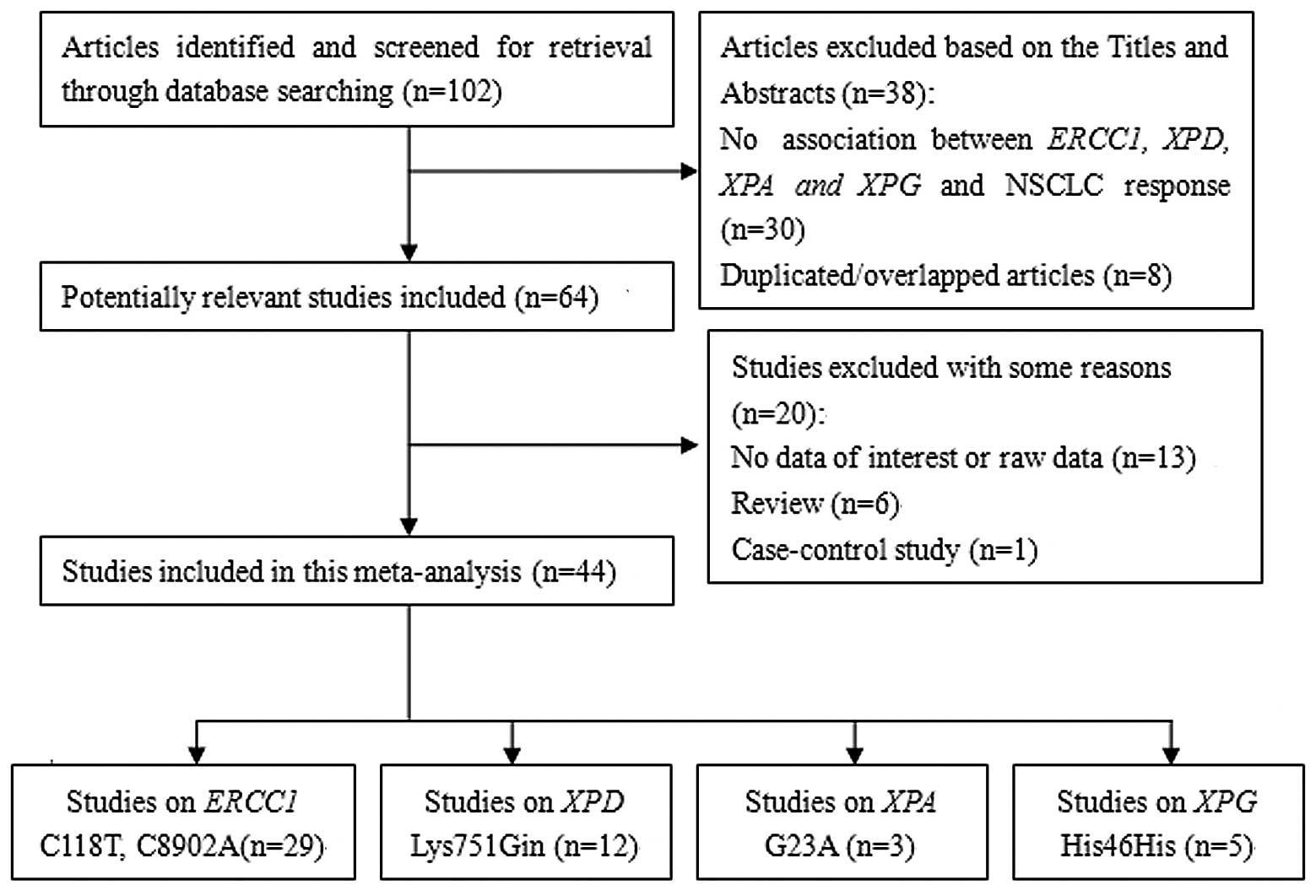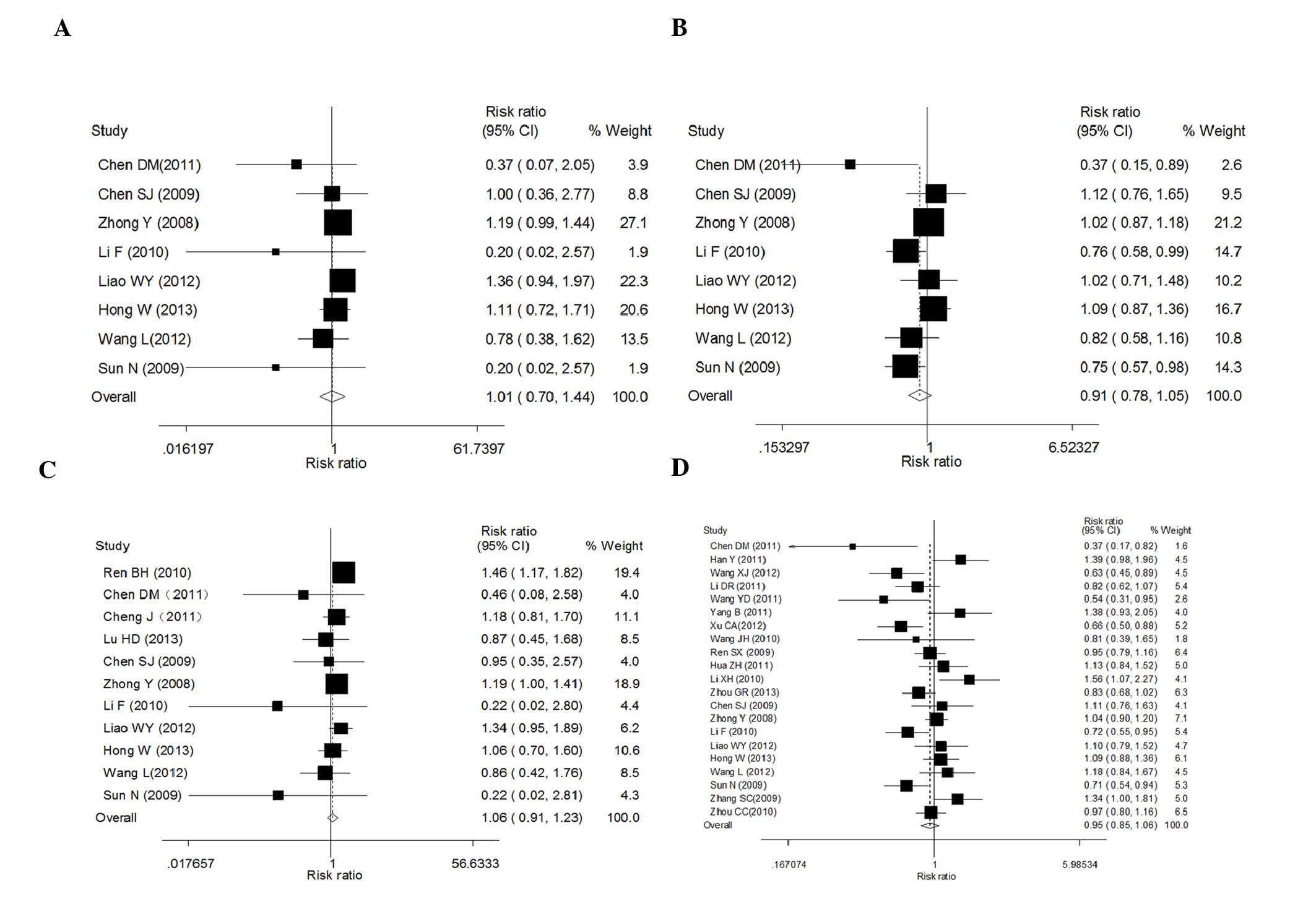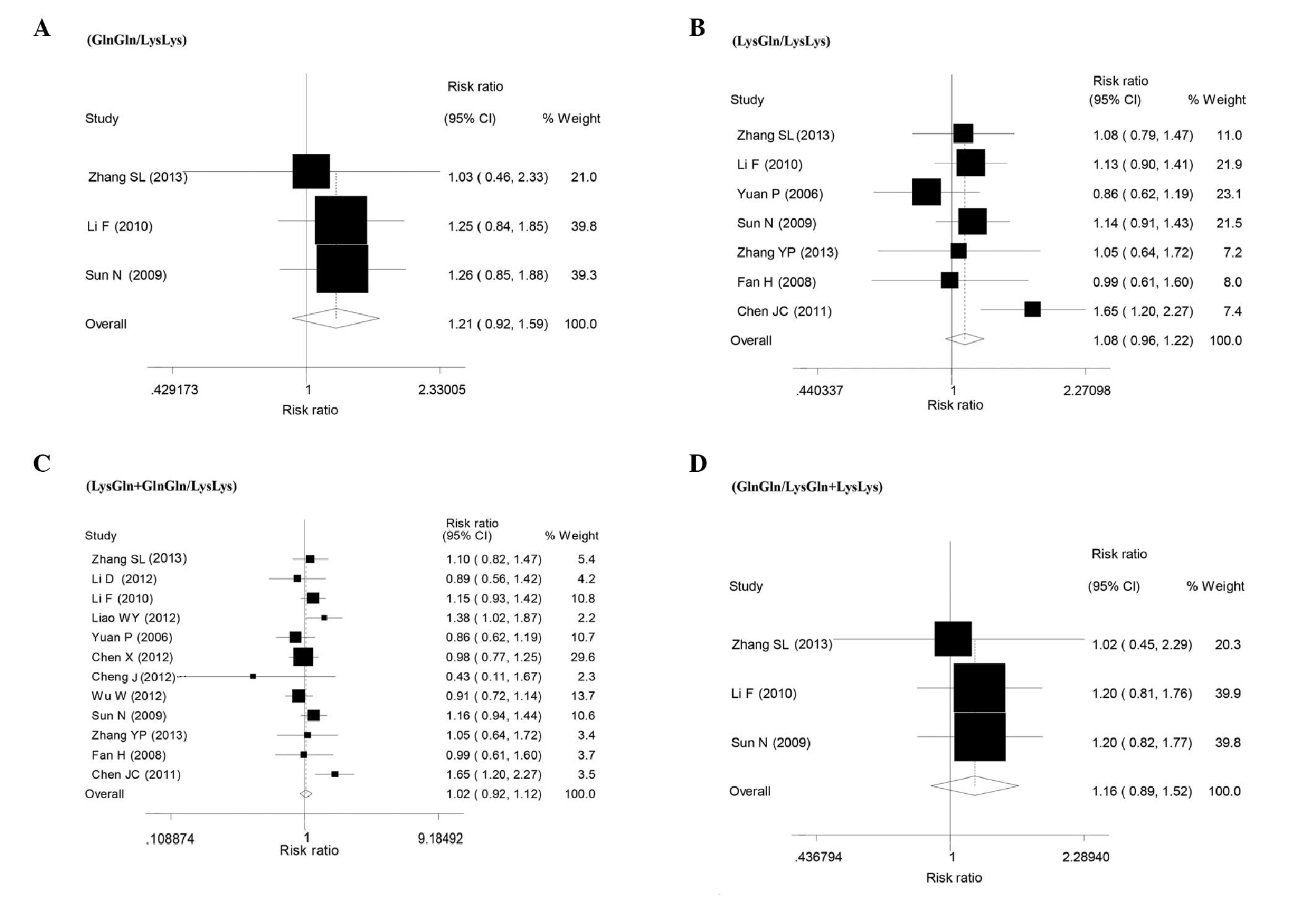|
1
|
Xu TP, Shen H, Liu LX and Shu YQ:
Association of ERCC1-C118T and -C8092A polymorphisms with lung
cancer risk and survival of advanced-stage non-small cell lung
cancer patients receiving platinum-based chemotherapy: a pooled
analysis based on 39 reports. Gene. 526:265–274. 2013. View Article : Google Scholar : PubMed/NCBI
|
|
2
|
Jemal A, Siegel R, Ward E, et al: Cancer
statistics, 2007. CA Cancer J Clin. 57:43–66. 2007. View Article : Google Scholar
|
|
3
|
Xing D, Tan W, Wei Q and Lin D:
Polymorphisms of the DNA repair gene XPD and risk of lung cancer in
a Chinese population. Lung Cancer. 38:123–129. 2002. View Article : Google Scholar : PubMed/NCBI
|
|
4
|
Jemal A, Siegel R, Ward E, et al: Cancer
statistics, 2009. CA Cancer J Clin. 59:225–249. 2009. View Article : Google Scholar
|
|
5
|
Pujol JL, Barlesi F and Daurès JP: Should
chemotherapy combinations for advanced non-small cell lung cancer
be platinum-based? A meta-analysis of phase III randomized trials.
Lung Cancer. 51:335–345. 2006. View Article : Google Scholar : PubMed/NCBI
|
|
6
|
Ohe Y, Ohashi Y, Kubota K, et al:
Randomized phase III study of cisplatin plus irinotecan versus
carboplatin plus paclitaxel, cisplatin plus gemcitabine, and
cisplatin plus vinorelbine for advanced non-small-cell lung cancer:
Four-Arm Cooperative Study in Japan. Ann Oncol. 18:317–323. 2007.
View Article : Google Scholar : PubMed/NCBI
|
|
7
|
Rosell R, Cecere F, Santarpia M, et al:
Predicting the outcome of chemotherapy for lung cancer. Curr Opin
Pharmacol. 6:323–331. 2006. View Article : Google Scholar : PubMed/NCBI
|
|
8
|
Jun L, Haiping Z and Beibei Y: Genetic
polymorphisms of GSTP1 related to response to
5-FU-oxaliplatin-based chemotherapy and clinical outcome in
advanced colorectal cancer patients. Swiss Med Wkly. 139:724–728.
2009.PubMed/NCBI
|
|
9
|
Ronen A and Glickman BW: Human DNA repair
genes. Environ Mol Mutagen. 37:241–283. 2001. View Article : Google Scholar
|
|
10
|
Wei Q and Spitz MR: The role of DNA repair
capacity in susceptibility to lung cancer: a review. Cancer
Metastasis Rev. 16:295–307. 1997. View Article : Google Scholar : PubMed/NCBI
|
|
11
|
Goode EL, Ulrich CM and Potter JD:
Polymorphisms in DNA repair genes and associations with cancer
risk. Cancer Epidemiol Biomarkers Prev. 11:1513–1530.
2002.PubMed/NCBI
|
|
12
|
van Hoffen A, Balajee AS, van Zeeland AA
and Mullenders LH: Nucleotide excision repair and its interplay
with transcription. Toxicology. 193:79–90. 2003.PubMed/NCBI
|
|
13
|
Choi JH, Ahn MJ, Rhim HC, et al:
Comparison of WHO and RECIST criteria for response in metastatic
colorectal carcinoma. Cancer Res Treat. 37:290–293. 2005.
View Article : Google Scholar : PubMed/NCBI
|
|
14
|
DerSimonian R and Laird N: Meta-analysis
in clinical trials. Control Clin Trials. 7:177–188. 1986.
View Article : Google Scholar : PubMed/NCBI
|
|
15
|
Cochran WG: The comparison of percentages
in matched samples. Biometrika. 37:256–266. 1950. View Article : Google Scholar : PubMed/NCBI
|
|
16
|
Higgins JP, Thompson SG, Deeks JJ and
Altman DG: Measuring inconsistency in meta-analyses. BMJ.
327:557–560. 2003. View Article : Google Scholar : PubMed/NCBI
|
|
17
|
Begg CB and Mazumdar M: Operating
characteristics of a rank correlation test for publication bias.
Biometrics. 50:1088–1101. 1994. View
Article : Google Scholar : PubMed/NCBI
|
|
18
|
Egger M, Davey Smith G, Schneider M and
Minder C: Bias in meta-analysis detected by a simple, graphical
test. BMJ. 315:629–634. 1997. View Article : Google Scholar : PubMed/NCBI
|
|
19
|
Ren BH, Yang X, Li M, et al: Single
nucleotide polymorphisms in DNA repair gene ERCCl predict clinical
response to platinum-based chemotherapy in non-small cell lung
cancer. Chin J Exp Surg. 27:1200–1202. 2010.
|
|
20
|
Han Y, Liang J, Lv HY, et al: ERCC1 and
XRCC1 gene polymorphisms and clinical response to platinum-based
chemotherapy in advanced non-small cell lung cancer. Chin J Prac
Intern Med. 31:638–639. 2011.
|
|
21
|
Chen DM and Wang NJ: Association of the
protein expression and gene polymorphisms in DNA repair genes
XRCC1, ERCC1, RRM1 and the effect of platinum-based regimens
chemotherapy in advanced non-small cell lung cancer patients. PhD
dissertation. Michigan State University. MM dissertation, Ningxia
Med Univ, ProQuest; 2011
|
|
22
|
Zhang SC and Li Q: Clinical significance
of expression of ERCC1, class III β-tubulin in resected patients
with non-small cell lung cancer and association between
polymorphisms of ERCC1 and response and survival in advanced
non-small cell lung cancer patients treated with cisplatin-based
chemotherapy. PhD dissertation. The Tuberculosis Thoracic Tumor
Research Institute of Beijing, ProQuest; 2009
|
|
23
|
Cheng J, Ha M, Wang Y, et al: A C118T
polymorphism of ERCC1 and response to cisplatin chemotherapy in
patients with late-stage non-small cell lung cancer. J Cancer Res
Clin Oncol. 138:231–238. 2012. View Article : Google Scholar : PubMed/NCBI
|
|
24
|
Wang XJ, Xu CA, Zhang Y, et al:
Relationship between ERCC1 and XPD genetic polymorphism and
sensitivity of platinum-based chemotherapy in advanced non-small
cell lung cancer. Chin Gen Pract. 15:1010–1014. 2012.
|
|
25
|
Lu HD, Cui EH and Hua F: The association
between the susceptibility to platinum drugs and the genetic
polymorphisms of ERCC l and BAG-1 in patients with advanced
non-small cell lung cancer. China Modern Doctor. 51:65–67.
2013.
|
|
26
|
Zhang SL, Zhang ZL and Shi MH: Association
between polymorphisms of ERCC1 and XPD and sensitivity to
platinum-based chemotherapy in advanced non-small cell lung cancer.
Jiangsu Med J. 39:303–305. 2013.
|
|
27
|
Li D, Zhou Q, Liu Y, et al: DNA repair
gene polymorphism associated with sensitivity of lung cancer to
therapy. Med Oncol. 29:1622–1628. 2012. View Article : Google Scholar : PubMed/NCBI
|
|
28
|
Wang YD, Cheng J, Chen JC, et al: The
association of genetic polymorphisms of BAG-1 and ERCCl with the
clinical response to platinum drugs in patients with advanced
non-small cell lung cancer. Tumor. 31:824–829. 2011.
|
|
29
|
Yang B and Hang FC: Polymorphisms in
ERCC1, RRM1 genes and sensitivity to gemcitabine/cisplatin
chemotherapy in advanced non-small cell lung cancer. MM
dissertation. Shanxi Med Univ, ProQuest; 2011
|
|
30
|
Xu CA, Li Q, Wang XJ, et al: Sensitivity
relationship of ERCC1 and XRCC1 genetic polymorphism on response of
platinum-based chemotherapy in advanced NSCLC. J Pract Oncol.
27:245–250. 2012.
|
|
31
|
Wang J, Zhang Q, Zhang H, et al:
Association between polymorphisms of ERCC1 and response in patients
with advanced non-small cell lung cancer receiving cisplatin-based
chemotherapy. Zhongguo Fei Ai Za Zhi. 13:337–341. 2010.(In
Chinese).
|
|
32
|
Chen SJ and Xu XJ: The relationship
between MDR1 and ERCC1 genetic polymorphisms and haplotype response
rate of platinum-based chemotherapy and side effect on non-small
cell lung cancer therapy. MM dissertation. Shantou University,
ProQuest; 2009
|
|
33
|
Ren SX, Zhou CC, Zhou SW, et al:
Predictive role of ERCC1 and XRCC3 gene polymorphism on response of
platinum-based chemotherapy in advanced NSCLC. J Oncol. 15:706–710.
2009.
|
|
34
|
Hua ZH, Fang WZ, Zhao ZQ, et al:
Association study of ERCC1 and ERCC4 genetic polymorphism with
response and survival in non-small cell lung cancer patients
treated with cisplatin-based chemotherapy. Acta Metallurgica
Sinica. 16:772–778. 2011.
|
|
35
|
Zhou C, Ren S, Zhou S, et al: Predictive
effects of ERCC1 and XRCC3 SNP on efficacy of platinum-based
chemotherapy in advanced NSCLC patients. Jpn J Clin Oncol.
40:954–960. 2010. View Article : Google Scholar : PubMed/NCBI
|
|
36
|
Zhong Y, Lu DR, Han BH, et al: The
association study of ERCCl polymorphism and chemotherapy
response/toxicity of lung cancer. MM dissertation. Fudan
University, ProQuest; 2008
|
|
37
|
Li F, Sun X, Sun N, et al: Association
between polymorphisms of ERCC1 and XPD and clinical response to
platinum-based chemotherapy in advanced non-small cell lung cancer.
Am J Clin Oncol. 33:489–494. 2010. View Article : Google Scholar : PubMed/NCBI
|
|
38
|
Liu YF, Guan XX, Chen LB, et al: Study on
ERCC1, XPD and XPA polymorphisms for prediction of platinum-based
chemotherapy sensitivity in non-small cell lung cancer. Chin J
Cancer Prev Treat. 15:1285–1288. 2008.
|
|
39
|
Liao WY, Shih JY, Chang GC, et al: Genetic
polymorphism of XRCC1 Arg399Gln is associated with survival in
non-small-cell lung cancer patients treated with
gemcitabine/platinum. J Thorac Oncol. 7:973–981. 2012. View Article : Google Scholar : PubMed/NCBI
|
|
40
|
Hong W, Wang K, Zhang YP, et al:
Methylenetetrahydrofolate reductase C677T polymorphism predicts
response and time to progression to gemcitabine-based chemotherapy
for advanced non-small cell lung cancer in a Chinese Han
population. J Zhejiang Univ Sci B. 14:207–215. 2013. View Article : Google Scholar : PubMed/NCBI
|
|
41
|
Gao CM, Shi MQ, Wu JZ, et al:
Polymorphisms in ERCC1, XRCC1 genes and sensitivity to
gemcitabine/cisplatin chemotherapy in non-small cell lung cancer.
Chin J Cancer Prev Treat. 16:27–30. 2010.
|
|
42
|
Jin YF, Li TC, Wang Y, et al: Single
nucleotide polymorphisms in ERCCl and XPD genes and sensitivity to
platinum-based chemotherapy in non-small-cell Iung cancer.
Carcinogenesis, Teratogenesis & Mutagenesis. 22:374–378.
2010.
|
|
43
|
Su T and Cao GW: Associations of DNA
repair gene, MDRl, and PTPRD polymorphisms with chemotherapy and
survival in lung cancer patients. MM dissertation. Second Military
Medical University, ProQuest; 2012
|
|
44
|
Wang L, Dai XF, Wu G, et al: Predictive
value of excision repair cross-complementation group 1 (ERCCl)
polymorphism on chemotherapy response and survival of advanced
non-small cell lung cancer patients treated with cisplatin. Herald
Med. 31:720–724. 2012.
|
|
45
|
Li XH, Jiang WF, Zhang HL, et al:
Relationship between SNPs of ERCC1 in peripheral blood of NSCLC and
effects of cisplatin-based chemotherapy. Chin J Cancer Prev Treat.
17:169–172. 2010.
|
|
46
|
Zhou GR, Feng JF, Lu JW, et al: On
sensitivity of XRCC1 and ERCC1 single nucleotide polymorphism and
non-small cell lung cancer to platinum-based chemotherapy. J Hainan
Med Univ. 20:20–24. 2013.
|
|
47
|
Sun N, Chen BA and Sun XC: Association
between single nucleotide polymorphisms of some genes and clinical
response to platinum-based chemotherapy in advanced non-small cell
lung cancer (PhD thesis). Southeast University. 2009.
|
|
48
|
KimCurran V, Zhou C, Schmid-Bindert G, et
al: Lack of correlation between ERCC1 (C8092A) single nucleotide
polymorphism and efficacy/toxicity of platinum based chemotherapy
in Chinese patients with advanced non-small cell lung cancer. Adv
Med Sci. 56:30–38. 2011. View Article : Google Scholar : PubMed/NCBI
|
|
49
|
Yuan P, Miao XP, Zhang XM, et al: XRCCl
and XPD genetic polymorphisms predict clinical responses to
platinum-based chemotherapy in advanced non-small cell lung cancer.
Zhonghua Zhong Liu Za Zhi. 28:196–199. 2006.(In Chinese).
|
|
50
|
Chen X, Sun H, Ren S, et al: Association
of XRCC3 and XPD751 SNP with efficacy of platinum-based
chemotherapy in advanced NSCLC patients. Clin Transl Oncol.
14:207–213. 2012. View Article : Google Scholar : PubMed/NCBI
|
|
51
|
Yao CY, Huang XE, Li C, et al: Lack of
influence of XRCC1 and XPD gene polymorphisms on outcome of
platinum-based chemotherapy for advanced non small cell lung
cancers. Asian Pac J Cancer Prev. 10:859–864. 2009.PubMed/NCBI
|
|
52
|
Wu W, Li H, Wang H, et al: Effect of
polymorphisms in XPD on clinical outcomes of platinum-based
chemotherapy for Chinese non-small cell lung cancer patients. PLoS
One. 7:e332002012. View Article : Google Scholar : PubMed/NCBI
|
|
53
|
Zhang YP, Xue HB, Ling Y, et al:
Correlation between the polymorphisms in XPD751 gene and
sensitivity and toxicity of chemotherapy in advanced non-small cell
lung cancer. Hainan Med J. 24:648–650. 2013.
|
|
54
|
Fan H, Huang XE, Zhang Q, et al:
Relationship of XRCC1 and XPD gene polymorphisms with
chemosensitivity to platinum-based chemotherapy in advanced
non-small cell lung cancer. Pract Geriatr. 22:306–314. 2008.(In
Chinese).
|
|
55
|
Chen JC, Liu ZL, Cheng J, et al:
Relationship between XPD single nudeotide polymorphisms and
platinum sensitivity in advanced non-small cell lung Cancer. Chin J
Gerontol. 31:1114–1117. 2011.(In Chinese).
|
|
56
|
Ren S, Zhou S, Wu F, et al: Association
between polymorphisms of DNA repair genes and survival of advanced
NSCLC patients treated with platinum-based chemotherapy. Lung
Cancer. 75:102–109. 2012. View Article : Google Scholar : PubMed/NCBI
|
|
57
|
Sun XC, Su N, Cheng HY, et al: XPA A23G
polymorphism and clinical response to platin-based chemotherapy in
advanced non-small cell lung cancer. J Med Postgrad. 20:1271–1273.
2007.
|
|
58
|
Jia XF, Liang J, Lv HY, et al:
Relationship between XPA and XPG polymorphisms and platinum-based
chemotherapy outcomes in advanced non-small cell lung cancer. Prog
Mod Biomed. 11:1718–1722. 2011.
|
|
59
|
Feng J, Sun X, Sun N, et al: XPA A23G
polymorphism is associated with the elevated response to
platinum-based chemotherapy in advanced non-small cell lung cancer.
Acta Biochim Biophys Sin (Shanghai). 41:429–435. 2009. View Article : Google Scholar : PubMed/NCBI
|
|
60
|
Zhang T, Sun J, Lv M, et al: XPG is
predictive gene of clinical outcome in advanced non-small-cell lung
cancer with platinum drug therapy. Asian Pac J Cancer Prev.
14:701–705. 2013. View Article : Google Scholar : PubMed/NCBI
|
|
61
|
Lv HY, Li QC, Wei HJ, et al: Relationship
between GSTP1 and XPG genetic polymorphisms and survival of
platinum-based chemotherapy in advanced non-small cell lung cancer
patients. China Oncol. 22:609–617. 2012.
|
|
62
|
Sun X, Li F, Sun N, et al: Polymorphisms
in XRCC1 and XPG and response to platinum-based chemotherapy in
advanced non-small cell lung cancer patients. Lung Cancer.
65:230–236. 2009. View Article : Google Scholar : PubMed/NCBI
|
|
63
|
Yin M, Yan J, Voutsina A, et al: No
evidence of an association of ERCC1 and ERCC2 polymorphisms with
clinical outcomes of platinum-based chemotherapies in non-small
cell lung cancer: a meta-analysis. Lung Cancer. 72:370–377. 2011.
View Article : Google Scholar : PubMed/NCBI
|
|
64
|
Yu D, Shi J, Sun T, et al: Pharmacogenetic
role of ERCC1 genetic variants in treatment response of
platinum-based chemotherapy among advanced non-small cell lung
cancer patients. Tumour Biol. 33:877–884. 2012. View Article : Google Scholar : PubMed/NCBI
|
|
65
|
Machius M, Henry L, Palnitkar M and
Deisenhofer J: Crystal structure of the DNA nucleotide excision
repair enzyme UvrB from Thermus thermophilus. Proc Natl Acad
Sci USA. 96:11717–11722. 1999. View Article : Google Scholar : PubMed/NCBI
|
|
66
|
Hoeijmakers JH: DNA damage, aging, and
cancer. N Engl J Med. 361:1475–1485. 2009. View Article : Google Scholar
|
|
67
|
Friedberg EC: DNA damage and repair.
Nature. 421:436–440. 2003. View Article : Google Scholar : PubMed/NCBI
|
|
68
|
Furuta T, Ueda T, Aune G, et al:
Transcription-coupled nucleotide excision repair as a determinant
of cisplatin sensitivity of human cells. Cancer Res. 62:4899–4902.
2002.PubMed/NCBI
|
|
69
|
Wei HB, Hu J, Shang LH, et al: A
meta-analytic review of ERCC1/MDR1 polymorphism and
chemosensitivity to platinum in patients with advanced non-small
cell lung cancer. Chin Med J (Engl). 125:2902–2907. 2012.PubMed/NCBI
|
|
70
|
Wei SZ, Zhan P, Shi MQ, et al: Predictive
value of ERCC1 and XPD polymorphism in patients with advanced
non-small cell lung cancer receiving platinum-based chemotherapy: a
systematic review and meta-analysis. Med Oncol. 28:315–321. 2011.
View Article : Google Scholar : PubMed/NCBI
|

















